December 22, 2021; Adama, Ethiopia – The Agricultural Bureau of Southern Nations, Nationalities and Peoples Regional State (SNNPRS) expressed its readiness to adopt and make a seamless transition to solar-powered irrigation systems (SIPS). The commitment was made during the two-day awareness raising workshop organized by GGGI Ethiopia on SPIS, Climate Smart Agriculture (CSA), and Ecosystem Services for pertinent stakeholders drawn from South Omo, Wolaita, and Gamo zones of the regional state.
To officially open the two-day training workshop, Mr. Andegna Shinale, Deputy Bureau Head of Agriculture at the SNNPRS, noted that given that solar energy is one of the most sustainable sources of energy in the foreseeable future, there is a dire need to adopt such modern technology to enhance agricultural production and productivity in the region.
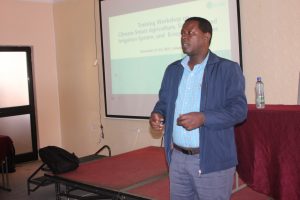
He said his region will pay due attention to adopting clean energy options including Solar PV, as it is one of the gateways for the reduction of Greenhouse gas (GHG) emissions in the agricultural sector.
Mr. Andegna expressed his conviction that his Bureau will remain committed to attach a paramount significance to CSA to boost agricultural productivity, while at the same time withstanding the adverse impact of climate change on a sustainable basis.
Mr. Andegna further stressed that the zones and woredas will be the main actors in mobilizing the community at the grassroots to exploit the potential of solar PV as a clean and sustainable source of energy for irrigation activities.
The Deputy Bureau Head urged the participants to actively participate in the workshop, as they are duty bound to put into practice the knowledge they have acquired in their respective localities.
Representing the Ministry of Agriculture (MoA), Mr. Daniel Balcha, a Senior Irrigation Engineer, stated that the future designs in agricultural technologies is most likely to be solar energy based. He claimed that solar energy option has created a conducive environment for the effective implementation of climate-responsive irrigation interventions.
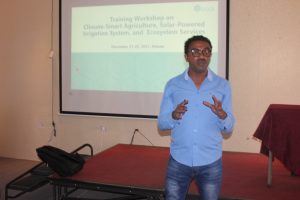
Mr. Daniel said GGGI has signed a Memorandum of Understanding (MoU) with MoA to support the CSA initiative of GoE through providing technical supports and introducing innovative ideas and technologies.
He said relevant pilot tests started at the household level by the Ministry have indicated the comparative advantages of solar-powered irrigation scheme against the diesel-based, and such innovative practices will be scaled up across the regions in tune with the objective realities on the ground.
Following the opening remarks, Dr. Shiferaw Tafesse, Senior Program Officer with GGGI Ethiopia, delivered a presentation on topics covering key issues, including the current condition of the Ethiopian agricultural sector, climate change, CSA, agricultural innovation approaches, and ecosystem services.
He remarked that the issue of climate change has increasingly become a global concern, putting the survival of the present and future generation at stake. He stressed the need to develop an innovative and coordinated mechanisms to adequately reverse the debilitating impacts of climate change largely through mitigation and adaptation.
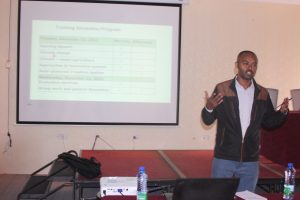 He further noted that the ecological dimension should also be seriously considered. He warned that the natural ecosystem is now being disturbed at an alarming level. “And if this goes on unabated, it will have an irreversible impact on the living organisms,” he said. Dr. Shiferaw underscored the need to maintain a balanced ecosystem and ensure its proper and smooth functioning.
He further noted that the ecological dimension should also be seriously considered. He warned that the natural ecosystem is now being disturbed at an alarming level. “And if this goes on unabated, it will have an irreversible impact on the living organisms,” he said. Dr. Shiferaw underscored the need to maintain a balanced ecosystem and ensure its proper and smooth functioning.
Mr. Ibsa Melkamu, Senior Energy Officer with GGGI Ethiopia, also gave a training on the technical, operational modalities, and socio -economic and environmental benefits of solar irrigation pumping system (SIPS).
In his presentation, Mr. Ibsa noted that familiarization of solar energy, as a sustainable source of energy option, is one of the major areas of intervention for GGGI in a drive to spur green investment and climate -smart agricultural ventures.
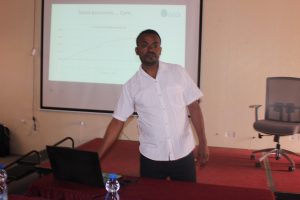
He described the benefits of solar based technologies including SIPS as economically, technically, financially, environmentally viable and sustainable for the user community once its initial investment cost is adequately concluded.
In addition to presentations and discussions, group work was given to the participants to discuss and come up with recommendations for promoting SPIS and facilitating the implementation of CSA practices that are relevant to their regional context. The participants presented the findings of their group works during the plenary session.
In his closing remarks, Mr. Kassaye Haile, Case Team Coordinator for small-scale irrigation, SNNP Bureau of Agriculture, noted that the training was very helpful in terms of enhancing the awareness level of the participants about CSA initiative that the GoE has embarked on.
He said his Bureau has selected the three zones for pilot-testing solar-powered irrigation schemes due to favorable grounds of sunlight (radiation) and other relevant resources.
Mr. Kassaye called on the participants to make an assessment on the demand for solar energy options and to raise the awareness level of local communities on the multifaceted benefits of the technology. He further asked GGGI to leverage the availability of solar technologies in close collaboration with the Small-Scale Irrigation Directorate of MoA.
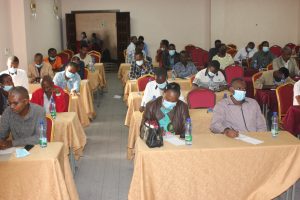
The training workshop was wrapped up by adopting action points which are deemed essential to proactively promote solar-based irrigation system in the region.